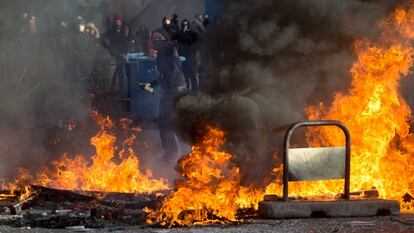Police arrest 53 during protests at Madrid’s Complutense University
Officers evict group of demonstrators who had locked themselves in student building a week ago Trash containers and pallets set ablaze during day of strike

A total of 53 people were arrested on Wednesday at Madrid’s Complutense University, according to police sources. Half of the people detained are students, while the remainder are squatters and members of far-left groups, according to the same sources.
Some of the arrests came after a group of demonstrators at the university set up barricades and set fire to trash containers, as the first day of a 48-hour strike to protest education spending cuts got underway.
The remainder came after the police responded to a request via fax made by the university to clear a student services building, which had been occupied for a number of days by students who were protesting against tougher requirements for access to grants.
Sources at the university explained they had been trying unsuccessfully to negotiate with the demonstrators, and added in a press release that they were “trying to restart the activities that are on offer in the building on a daily basis to benefit and attend to the students.”
Staff found the doors of their offices had been locked with chains”
The university took the decision to call in the police “given the deterioration of the conditions in terms of safety and hygiene” in the building. Given the situation, “the Madrid Complutense University has decided to reestablish normal working conditions and access to the student building,” the statement continued, adding that it regretted “the actions of intolerant minority groups, which distract from the legitimate expression of discontent and demands of other students.”
The president of the university, José Carrillo, defended the decision because the occupation of the building was impeding a total of 130 employees from getting to their place of work. “Yesterday we received a report from the health and safety committee that said that the building was in an unsafe and unhygienic condition, which was stopping them from working,” he explained on Wednesday. “There were a lot of people in there, as well as four dogs, butane canisters, cigarette smoke… With that report in my hand I couldn’t allow anyone into the building.” As such, the university took the decision on Tuesday to stop employees from entering the building, which also contains “sensitive” information about students, according to the president, “all of which is covered by the Data Protection Law.”
“Negotiations with the protesting students were broken off this morning when staff found the doors of their offices locked with chains,” Carrillo continued. “We cannot guarantee the safety of the students’ data and we had no other choice but to request they be removed.”
The students that were carrying out the sit-in admitted that they had butane canisters inside. “They were for cooking, but we cooked outside the office,” explained Riansares, an 18-year-old medical student. She escaped arrest as she had left the building in the morning to join the picket line of strikers outside. “We saw the police arrive,” she continued. “There were more than 100 of them, and they moved in a column to avoid anyone who was outside getting close.” She also claimed that the protestors had not been violent, “because in the assembly we held the day before we made it clear that we would only offer peaceful resistance.”
Tu suscripción se está usando en otro dispositivo
¿Quieres añadir otro usuario a tu suscripción?
Si continúas leyendo en este dispositivo, no se podrá leer en el otro.
FlechaTu suscripción se está usando en otro dispositivo y solo puedes acceder a EL PAÍS desde un dispositivo a la vez.
Si quieres compartir tu cuenta, cambia tu suscripción a la modalidad Premium, así podrás añadir otro usuario. Cada uno accederá con su propia cuenta de email, lo que os permitirá personalizar vuestra experiencia en EL PAÍS.
¿Tienes una suscripción de empresa? Accede aquí para contratar más cuentas.
En el caso de no saber quién está usando tu cuenta, te recomendamos cambiar tu contraseña aquí.
Si decides continuar compartiendo tu cuenta, este mensaje se mostrará en tu dispositivo y en el de la otra persona que está usando tu cuenta de forma indefinida, afectando a tu experiencia de lectura. Puedes consultar aquí los términos y condiciones de la suscripción digital.








































